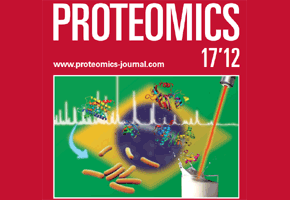

This special edition, the first dedicated to a single country, includes articles by 16 Brazilian researchers on topics ranging from cancer, agricultural pests, milk quality and biodiversity
This special edition, the first dedicated to a single country, includes articles by 16 Brazilian researchers on topics ranging from cancer, agricultural pests, milk quality and biodiversity.
This special edition, the first dedicated to a single country, includes articles by 16 Brazilian researchers on topics ranging from cancer, agricultural pests, milk quality and biodiversity.

This special edition, the first dedicated to a single country, includes articles by 16 Brazilian researchers on topics ranging from cancer, agricultural pests, milk quality and biodiversity
By Karina Toledo
Agência FAPESP – Already the country of soccer and Carnival, Brazil could soon also be known as the “country of proteomics”—so says the Letter from the Editor of the October issue of the journal Proteomics, one of the field’s most important publications.
Aside from the green and yellow flag on the cover, the special edition entitled “Proteomics in Brazil” contains 16 articles by Brazilian researchers. It was coordinated by Daniel Martins de Souza, a former FAPESP doctoral fellow who today works as an associate researcher for the Max-Planck-Institut für Psychiatrie and the Ludwig Maximilians Universität, both in Germany.
“This is the first time that the journal has dedicated an entire edition to one country,” Souza told Agência FAPESP. Souza came up with the idea of the special issue, which was well received by Editor-in-Chief Michael Dunn.
“Dunn told me that the number of articles submitted by Brazilians had increased, so I suggested a special edition including only Brazilian research. He agreed and invited me to coordinate the issue,” said Souza.
Proteomics is a relatively new field of study that emerged in the 1990s as a natural extension of the focus on genomics. “Proteomics is dedicated to investigating the set of proteins expressed by a cell, tissue or organism at a given moment under a set of conditions as determined by the genome,” explained Souza.
However, unlike the genome, which is static, the proteome is extremely dynamic. It changes itself according to the conditions and stimuli to which the organism is exposed. “Understanding how protein expression changes due to illness, for example, allows us to better understand the biochemical pathways involved, to identify potential biomarkers and improve directed treatments,” said the researcher.
Brazil has kept pace with the global increase of research in this area with diversified scientific production, Souza says. In his editorial, he recalls the first steps taken in the 1980s by professionals who worked with protein chemistry and mass spectrometry.
“The pioneering centers were the Universidade de Brasília (UnB) and the Universidade Estadual de Campinas (UNICAMP). Today, other leaders in the field are the Rio de Janeiro Proteomics Network, composed of scientists from the Universidade Federal do Rio de Janeiro (UFRJ) and Fiocruz (Oswaldo Cruz Foundation). Proteomics are also performed at the Butantan Institute in São Paulo and at the National Light Synchrotron Laboratory (LNLS),” he commented.
Thanks to the work of these groups, Souza says in his editorial, Brazil has gained enough critical mass to create the Brazilian Proteomics Society. The organization’s inauguration is expected to be held this year and will be led by UFRJ’s Gilberto Domont.
Souza says that the articles selected for the special edition of Proteomics are as varied as the research carried out in Brazil. “There is work being performed on cancer, multiple sclerosis, insulin resistance, umbilical cord stem cells, agricultural pests and even functional studies on protein interaction and structure,” he said.
The first article in the issue is an opinion piece in which researchers Magno Junqueira from UnB and Paulo Costa Carvalho from Fiocruz address the challenges of exploring Brazil’s rich biodiversity using proteomics techniques.
In another article by scientists from UNICAMP and Fiocruz, an animal model is used to study the proteins expressed during physical exhaustion. “The idea is to discover protein markers that indicate when an athlete is about to develop an injury due to excessive exercise,” explained Souza.
The image of a glass of milk featured on the cover of the magazine represents a study carried out at the USP School of Veterinary Medicine and Zootechny together with UNICAMP and the German company Daltonics.
“The authors developed a method that identifies the bacteria present in milk through their ribosomal proteins, in other words, without a need for bacterial cultivation,” said Souza.
Because the subject of neglected diseases could not be left out, the issue includes a proteomics study on Trypanosoma cruzi, the protozoa that cause Chagas disease, published by Fiocruz researchers from Paraná. This article reported the identification of proteins important for the parasite’s differentiation process and host infection.
All of the articles can be read today on the journal’s web site. The printed version will be published in October.
Republish
The Agency FAPESP licenses news via Creative Commons (CC-BY-NC-ND) so that they can be republished free of charge and in a simple way by other digital or printed vehicles. Agência FAPESP must be credited as the source of the content being republished and the name of the reporter (if any) must be attributed. Using the HMTL button below allows compliance with these rules, detailed in Digital Republishing Policy FAPESP.




